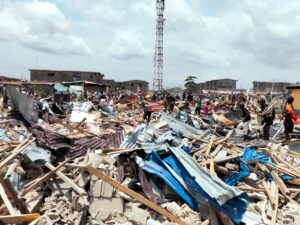For the residents of several informal communities across Lagos, the month of March was marred with pain and anguish resulting from the mass demolitions, forced evictions and slum clearance exercises executed by Lagos State authorities without notice, without compensation, and without any provision of alternative accommodation. On March 8th, 11th, 22nd, and 24th, respectively, officials of the Lagos State Building Control Agency (LASBCA) accompanied by security forces, demolished and razed down hundreds of homes in Hopeville Estate in Sangotedo, Maiyegun community in Lekki, Ifesowapo and Otto communities on the Lagos Mainland in Ebutte-Meta West, leaving behind tons of charred remains of business and residential properties, while rendering hundreds of people, including women and children, homeless and poorer.
Eyewitnesses told Spaces for Change | S4C that the demolitions began 30 minutes after notices were given to the evicted residents. Official reasons advanced for the demolitions range from noncompliance with building regulations, environmental sanitation concerns and the elimination of shanties and uninhabitable dwellings. Evicted residents are predominantly the urban poor living beyond two dollars a day. While rental values are high and far beyond the reach of average households in the city, the available housing stock in the city of Lagos targets only the super-rich. Mass clearance programs undertaken without safeguards fit into a recurring pattern of ‘urban development’ that appears determined to remove the poor from the city.
As the economic hub of the nation, Lagos state has witnessed accelerated urbanization over time as a result of the massive influx of citizens, leading to a constant need for more and more affordable housing. Housing shortages persist because the migration rate outpaces housing provisioning, forcing many residents to seek shelter in informal settlements or to explore makeshift accommodation options. Rather than upgrade living conditions or provide basic amenities in these settlements, the government responds through mass clearance and demolition exercises, designating these settlements as slums unfit for human habitation. No compensation is ever paid to displaced persons—a practice that dates back to the early 1990s when the Maroko forced evictions occurred. Since then, state authorities have embraced forced evictions and demolitions as an indispensable urban renewal strategy.
It is, however, instructive to observe that the recent demolition spree in Lagos transcends the so-called slums. It also targets well-built homes and luxury estates like HopeVille Estate. In a state where the demand for housing is greater than the supply, pulling down both makeshift and luxury homes in the name of urban renewal put question marks on the government’s sincerity in closing the housing deficit in the state. Out of Nigeria’s 28 million housing deficit figure, Lagos alone stood at a 17 million deficit, with an estimated 500,000 people migrating into Lagos annually. Pulling down homes for obscure reasons and minor contraventions that are repairable and fixable is equally inconsistent with urban planning with a human face.
This practice grossly violates the rights and freedom enshrined in international human rights instruments like the International Covenant on Economic, Social and Cultural Rights (ICESCR) to which Nigeria is a party. In particular, they contravene international standards which require adequate time should be given to residents before evictions and demolitions occur. In light of the above, S4C’s press releases have strongly demolished the demolitions and mass evictions of urban poor populations while demanding compensation for victims. Not only that, in collaboration with the Communities Alliance Against Displacement (CAD), S4C has also provided relief materials to the victims of forced displacement in Ifeoluwa, Ifesowapo, and Toluwani community development associations in order to cushion the effect of the enormous losses they suffered during the recent demolitions and forced evictions.






















